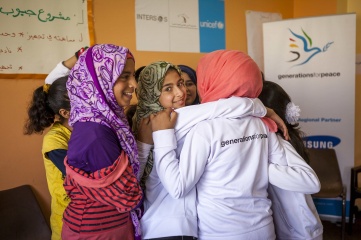Generations For Peace (GFP) has been awarded additional funding from UNICEF to expand a successful programme engaging volunteer youth leaders to strengthen social cohesion and resilience, and reduce the potential for violence in refugee host communities.
The programme has seen impressive positive impact in 10 communities over the last year. Building on this success, UNICEF is increasing its support, to expand the programme to 16 communities in 2016. To power the expansion, from 9-14 January, 80 Jordanian and Syrian youth leaders completed six days of intensive training, gaining the capacity and confidence to assess local conflict issues, identify a target group, and design, organize, run, and sustain an ongoing series of activities with youth in their communities.
The youth leaders work in Community Development Centres run by the JOHUD, and Youth Centres run by the Higher Council for Youth, in Ajloun, Amman, Irbid, Karak and Mafraq. The Generations For Peace training helps to empower youth leaders as peer educators, as they learn to design and facilitate activities using a unique conflict transformation curriculum. Following the training this month, Generations For Peace will continue to mentor and support the youth leaders as they organize weekly sessions for youth in their communities. A total of 22 weekly sessions helps to ensure that long-term behaviour change and conflict transformation impacts are secured. To expand the positive impact still further, the youth participants and trained volunteers will also design and conduct local community social cohesion initiatives, reaching an even wider audience with what they have learned.
HRH Prince Feisal Al Hussein of Jordan, Founder and Chairman of Generations For Peace, thanked UNICEF, noting: “We are grateful for the support of UNICEF and others who see the positive impacts of our work and are helping us to build on our strengths and successes to benefit the most vulnerable communities in Jordan. Our programmes over the past few years have demonstrated the effectiveness of empowering Jordanian and Syrian youth to lead activities in their own communities to break down stereotypes and barriers, build strong friendships with one another, and manage conflicts without violence.”
Robert Jenkins, UNICEF Country Representative for Jordan, said: “UNICEF is proud to increase our support to the ongoing work of Generations For Peace in improving the lives of children and youth affected by the Syrian refugee crisis in Jordan. In Jordanian communities hosting large numbers of Syrian refugees, youth-led activities that strengthen social cohesion and resilience are critical to ensuring youth can successfully participate and engage in society, and draw upon support networks when facing extreme challenges.”
Omar Alharaki, a volunteer who participated in the training, said: “I have to be an active member in this community; whatever I can offer, I will offer. We have to make sure that our community is a safe place, and this is why I volunteer. I also volunteer so I that can contribute to building a socially conscious generation. Even if we go back to Syria, we will have concepts and principles to take with us, and we will work hard to pass them on from generation to generation.”
Since the conflict in Syria began, more than 633,000 Syrians have registered as refugees in neighbouring Jordan (UNHCR 2015), 52% of whom are youth under the age of 18, and with 82% residing in host communities rather than refugee camps.
The work of Generations For Peace towards improving social cohesion among Jordanian and Syrian youth in host communities is also supported by the Norwegian Ministry of Foreign Affairs, the Inti Raymi Fund, Samsung, Orange, and DHL.
Source: Generations For Peace


